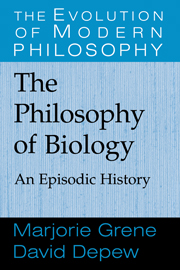Book contents
- Frontmatter
- Contents
- List of Figures
- Notes on Citations and References
- Acknowledgments
- Preface
- 1 Aristotle and After
- 2 Descartes, Harvey, and the Emergence of Modern Mechanism
- 3 The Eighteenth Century I
- 4 The Eighteenth Century II
- 5 Before Darwin I
- 6 Before Darwin II
- 7 Darwin
- 8 Evolution and Heredity from Darwin to the Rise of Genetics
- 9 The Modern Evolutionary Synthesis and Its Discontents
- 10 Some Themes in Recent Philosophy of Biology
- 11 Biology and Human Nature
- 12 The Philosophy of Biology and the Philosophy of Science
- References
- Index
11 - Biology and Human Nature
Published online by Cambridge University Press: 05 June 2012
- Frontmatter
- Contents
- List of Figures
- Notes on Citations and References
- Acknowledgments
- Preface
- 1 Aristotle and After
- 2 Descartes, Harvey, and the Emergence of Modern Mechanism
- 3 The Eighteenth Century I
- 4 The Eighteenth Century II
- 5 Before Darwin I
- 6 Before Darwin II
- 7 Darwin
- 8 Evolution and Heredity from Darwin to the Rise of Genetics
- 9 The Modern Evolutionary Synthesis and Its Discontents
- 10 Some Themes in Recent Philosophy of Biology
- 11 Biology and Human Nature
- 12 The Philosophy of Biology and the Philosophy of Science
- References
- Index
Summary
Introduction
The evolution of human beings, and the meaning of “human nature” within a comparative, biologically grounded framework of inquiry, is a huge topic, extending well beyond the contours of this book. Nonetheless, much of the interest that human beings have in other living beings reflects our unquenchable interest in ourselves. In this chapter, accordingly, we will say a few things about several aspects of human evolution, if only by way of commending further inquiry to the reader. We will touch, first, on human origins – “the descent of man,” in Darwin's phrase – with particular attention to the unity of the human species; second, on the vexed topic of nature and nurture; third, on the evolutionary mechanisms required to account for characteristics that human beings alone possess: large brains, language, and mind; and finally, we will touch on what implications, if any, can be drawn about the “future of man” from the Human Genome Project, and, more generally, from the fact that within the last several decades, we have begun to acquire the technical ability directly to manipulate genetic material. Much of what we will have to say involves revisiting some of the figures and theories we have encountered earlier in this book, with special attention this time to our own species.
The Descent of Man
Buffon is generally accorded the title of “father of anthropology.” In his Histoire naturelle de l'homme (1749), Buffon resolved to study human beings in the same way he had been studying other animals.
- Type
- Chapter
- Information
- The Philosophy of BiologyAn Episodic History, pp. 322 - 347Publisher: Cambridge University PressPrint publication year: 2004

